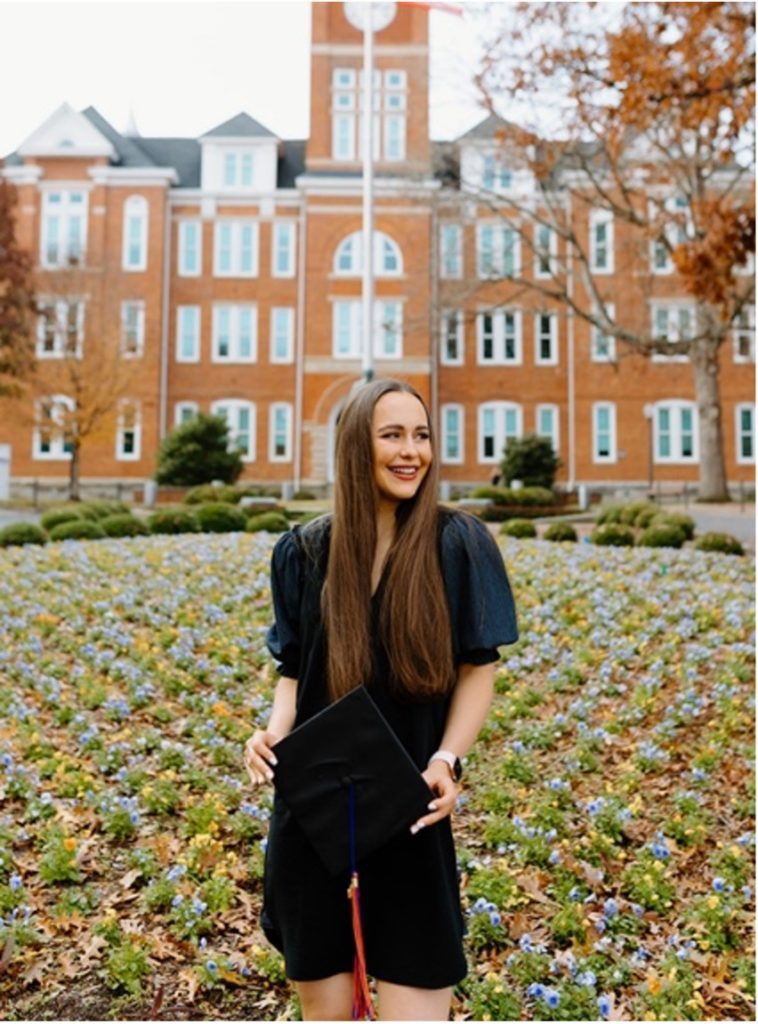
When exploring her college options, Clemson University senior Jordyn Carroll wanted to pursue a major that would prepare her for medical school.
She was looking for a program that offered learning opportunities beyond the typical pre-medical chemistry, physics and biology classes. A degree in health science fit the bill.
“I decided to come to Clemson very late in the application cycle. A gut feeling drew me here,” said Carroll. “As a pre-medical student, I wanted to pursue a major that would expand my knowledge and understanding of the population groups that I will ultimately serve as a physician.”
Graduating this week with an Honors degree, this student from Lexington, South Carolina, says that she will forever be grateful for her decision to come to Clemson.
The degree equipped her with a better understanding of the factors that influence health, making her feel better prepared to serve as a future provider. Her education also helped her understand the functional and financial aspects of the health care system and the patients they serve.
Being a member of the Honors College on campus gave her the opportunity to dive more deeply into topics she felt passionate about, such as health disparities, that she otherwise would not have been able to explore.
“Honors content became especially beneficial in my public health coursework,” said Carroll. “Throughout various Honors contracts, I have been able to write literature reviews about health disparities and explore the organic composition of pharmaceuticals, to name a few opportunities.”
Explore the Clemson University Honors College
The literature review Carroll conducted for her Honors contract led to the development of a new Honors seminar option with her faculty mentor, chemistry senior lecturer Elliot Ennis. Ennis encouraged her to participate in the seminar proposal process and to apply her research findings to their discussions about the course syllabus.
That process was a transformative opportunity for Carroll, who was able to incorporate content she was curious about into the seminar, such as pseudoscience related to medicinal herbs and fad dieting.
Ennis, in turn, was impressed by Carroll’s intuitive understanding of course design, content planning, and how to communicate complex ideas in simple language.
“She was always asking questions about designing courses and about how what she was learning fit into the real-world situations that we talked about in the Honors seminar,” said Ennis. “Her experiences and data strongly informed what went into the seminar, and without her contributions, I don’t think it would have turned out as well as it did.”
According to Ennis, the conversations the two shared while developing the seminar were some of the most enjoyable he had ever had with students. He also felt confident that, given her knowledge, she would have been able to lead class discussions on her own.
“I advised her to strongly consider working in a teaching hospital in the future,” continued Ennis. “She will make an amazing physician and teacher of patients one day. I can’t say enough wonderful things about her, and I hope I was able to teach her as much as she did me.”
The seminar, called Debunking Health Pseudoscience, launches this Spring term.

Carroll’s interest in health extended beyond her major, with many of her favorite memories coming from her extracurricular work as a yoga and cycle instructor on campus.
She also works off campus as a full-time clinical research coordinator at the Hawkins Foundation, where she was hired after a health science internship last spring. Her job requires Carroll to help ensure compliance with IRB and Clinical Trial Management Office policies, maintain billing mechanisms, and create protocols, informed consent documents, and case reports.
She acts as the primary research-clinical contact for the foundation, collecting all patient-reported outcomes, strength measurements and other patient data while overseeing the hiring and supervision of interns.
Carroll plans to continue working at the Hawkins Foundation and at a new cycle studio called Elevate Cycle, opening in Clemson this spring, before attending medical school in the fall.
Public health sciences lecturer Tanya Staton said that Carroll is incredibly bright and caring, traits that will serve her well as a practicing physician.
“Jordyn will be the coveted physician that every practice and patient wants. Most physicians get to a point at which they can no longer accept new patients due to their workload. Jordyn’s waiting list will only get longer because I can’t see anyone ever wanting another doctor.”
Tanya Staton, lecturer, public health sciences
As Carroll prepares to leave Clemson, she encourages first-year students to keep an open mind — and to trust themselves.
“That trust will guide you to a place that supports you academically, emotionally, socially and professionally,” said Carroll. “Clemson has truly been a place that has provided me all that support and more!”
